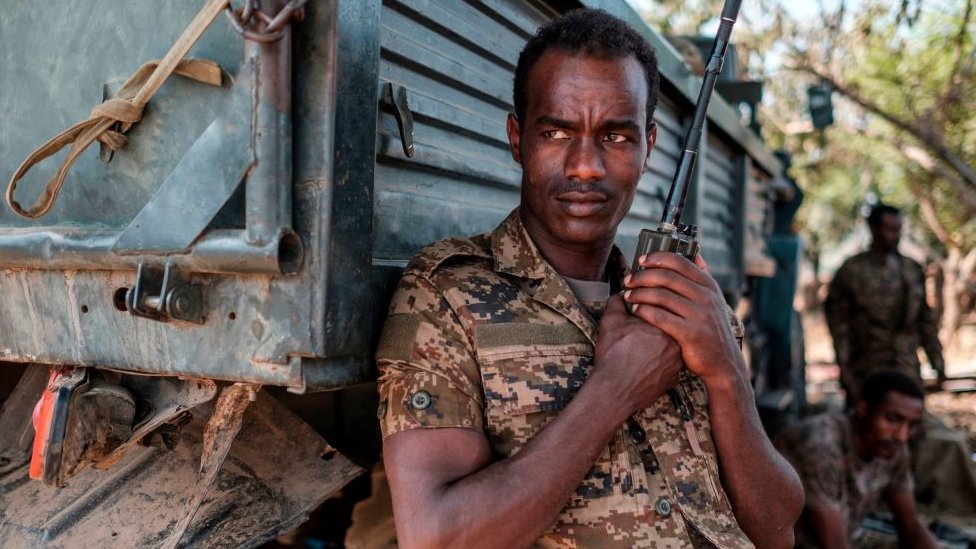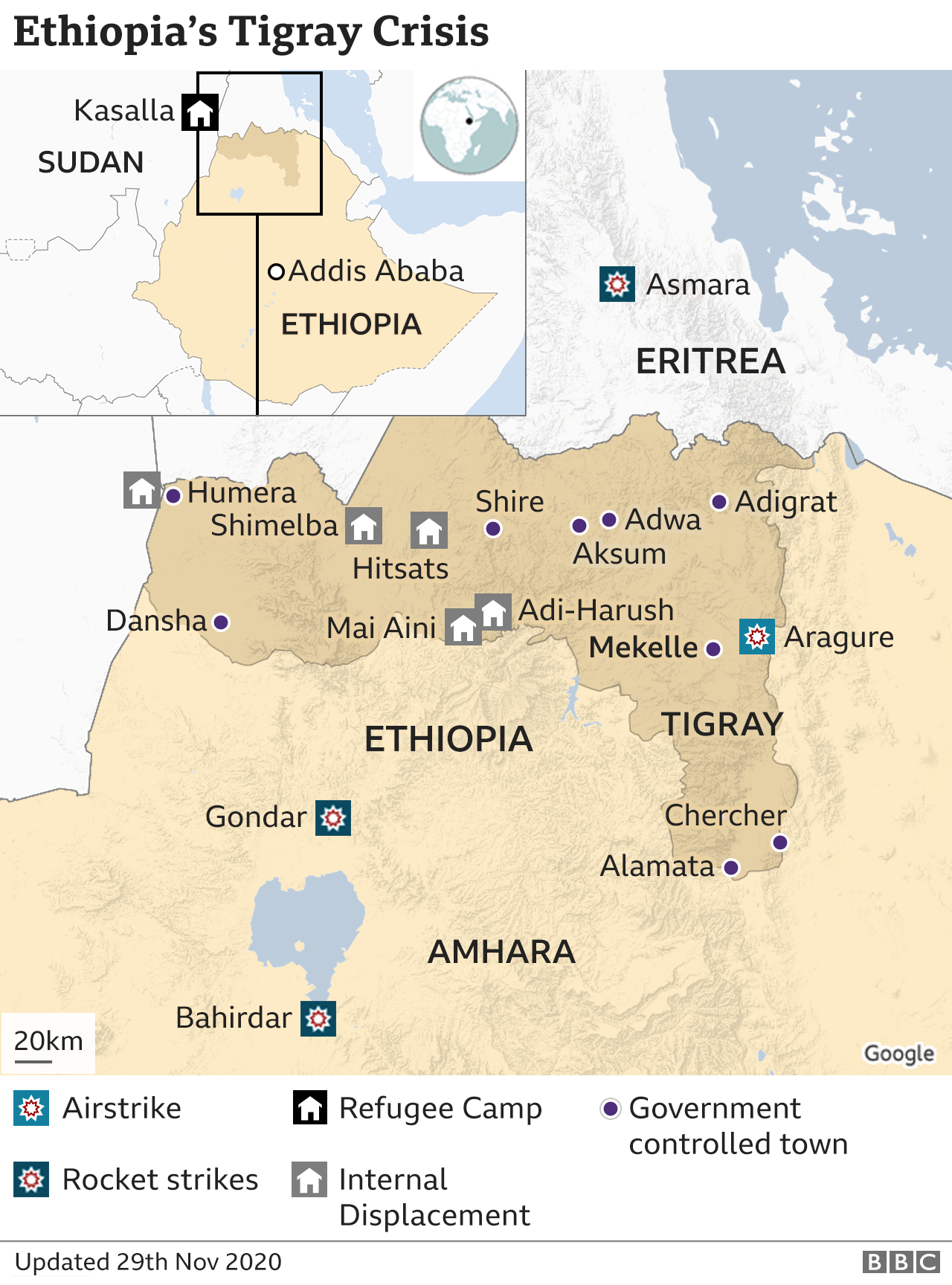Ethiopia's federal police are searching for the leaders of the Tigray People's Liberation Front after government soldiers entered the Tigray regional capital, the prime minster said.
Abiy Ahmed added that Mekelle's capture marked the "last phase" of the three-week conflict - but details are hard to confirm as communications are blocked.
The TPLF leader, meanwhile, vowed to fight on, in a statement to Reuters.
Hundreds have reportedly been killed in the conflict and thousands displaced.
It began earlier this month after Mr Abiy announced an operation against the TPLF, the regional party, accusing it of attacking the Ethiopian army's northern command HQ in Mekelle.
He has consistently described its leadership as a "criminal clique" and said that the police will "bring them to the court of law".
The BBC managed to speak briefly to one contact in Mekelle who said that federal soldiers were in the city and he had heard sporadic gunshots on Sunday morning. Some residents had earlier fled to the city's outskirts, he added.
Meanwhile, the US embassy in neighbouring Eritrea said six explosions were heard in the capital, Asmara, late on Saturday.
Tigrayan forces have previously fired rockets at Eritrea, which they accuse of backing Ethiopian government forces in the weeks-long conflict. It is not clear if the latest incidents in Asmara are linked to the fighting in Tigray.
What does the government say?
In a statement on Twitter, Mr Abiy said the army was in full control of Mekelle and that this "marks the completion of the [military's] last phase".
"I am pleased to share that we have completed and ceased the military operations in the Tigray region," he said.

The army had released thousands of soldiers taken by the TPLF and was in control of the airport and regional offices, Mr Abiy said, adding that the operation had been carried out with "due care for citizens".
There have been fears for the safety of the 500,000 people living in the city.
Confirming details from Tigray is very hard as telephone and internet lines have been down during the conflict.


How has the TPLF responded?
In a text message to Reuters, TPLF leader Debretsion Gebremichael did not directly comment on the situation on the ground, but said of the government forces: "Their brutality can only add [to] our resolve to fight these invaders to the last."
He added: "This is about defending our right to self-determination."
Mr Debretsion's whereabouts are unknown.
A TPLF statement read out on regional Tigray TV said: "Fascistic bombings have caused civilian deaths and injuries. The Tigray government has vowed that it would take retaliatory actions against the barbaric bombings".
It also accused the Eritrean government of involvement in the attack on Mekelle.
Tigray TV and another station from the region are now off air.
Analysts say the TPLF could now be preparing to return to the mountains to launch a guerrilla war against the federal government.
What are the humanitarian concerns?
The UN had warned of possible war crimes if the Ethiopian army attacked Mekelle.
It has also expressed concerns about the lack of access for humanitarian workers.
The Ethiopian authorities said on Thursday that "a humanitarian access route" overseen by the government would be opened, adding they were "committed to work with UN agencies... to protect civilians and those who need it".
Also on Thursday, Ethiopian troops were deployed along Tigray's border with Sudan, preventing people fleeing the violence from leaving the country, according to refugees.
In an update released on Saturday, the UN said that more than 40,000 Ethiopians had crossed over since the fighting began in early November.
Reporting on a visit to western Tigray, Wilson Mondal from the International Committee of the Red Cross said that in Dansha he had met people "living in a makeshift camp without food, water, or medical care.
"They told us they feared for their lives, and that they wanted safe passage out of the area," he said.
Ethiopia's state-appointed Human Rights Commission has accused a Tigrayan youth group of being behind a massacre this month in which it says more than 600 non-Tigrayan civilians in the town of Mai-Kadra were killed. The TPLF denied involvement.
In a meeting on Friday, Mr Abiy told African peace envoys that civilians would be protected.
Who are the TPLF?
The TPLF fighters, drawn mostly from a paramilitary unit and a well-drilled local militia, are thought to number about 250,000.
The organisation was founded in the 1970s and spearheaded the uprising against Marxist dictator Mengistu Haile Mariam, who was toppled in 1991.
It then went on to be the dominant political force in the country until Mr Abiy became prime minister in 2018.
Mr Debretsion has said the Tigray forces were "ready to die in defence of our right to administer our region".
What is the fighting about?
The conflict is rooted in longstanding tension between Ethiopia's government and the TPLF, sparked by Mr Abiy's moves to sideline the party.
When Mr Abiy postponed a national election because of coronavirus in June, relations further deteriorated.
The TPLF said the government's mandate to rule had expired, arguing that Mr Abiy had not been tested in a national election.
In September the party held its own election, which the government said was "illegal".
In early November, TPLF fighters entered a military base in Mekelle which led to the start of the federal army's operation in Tigray.

Find out more about the Tigray crisis:
https://news.google.com/__i/rss/rd/articles/CBMiMGh0dHBzOi8vd3d3LmJiYy5jby51ay9uZXdzL3dvcmxkLWFmcmljYS01NTEyMDU3MtIBNGh0dHBzOi8vd3d3LmJiYy5jby51ay9uZXdzL2FtcC93b3JsZC1hZnJpY2EtNTUxMjA1NzI?oc=5
2020-11-29 11:44:00Z
52781211807328
Tidak ada komentar:
Posting Komentar